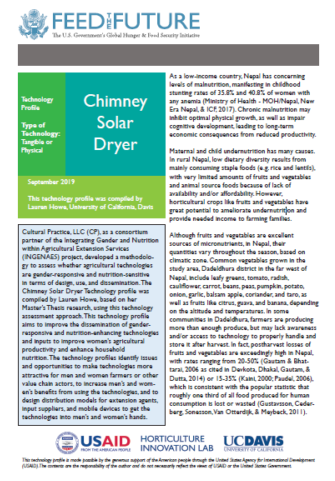The Chimney Solar Dryer Technology profile was compiled by Lauren Howe, based on her Master’s Thesis research in Nepal, using the technology assessment approach developed by Cultural Practice, LLC (CP), as a consortium partner of the Integrating Gender and Nutrition within Agricultural Extension Services (INGENAES) project. This technology profile aims to improve the dissemination of gender- responsive and nutrition-enhancing technologies and inputs to improve women’s agricultural productivity and enhance household nutrition. The technology profiles identify issues and opportunities to make technologies more attractive for men and women farmers or other value chain actors, to increase men’s and women’s benefits from using the technologies, and to design distribution models for extension agents, input suppliers, and mobile devices to get the technologies into men’s and women’s hands.
This pilot study revealed that the chimney dryer certainly has the potential to benefit women in terms of time and workload. However, for the advantages to extend into the area of income and asset generation, women need to be better integrated into value chain development for dried foods. Thus a gender-sensitive approach to value chain development is necessary, one that identifies and analyzes the root causes of gender-based systemic constraints to participation in economic activities and links these to structural change (FAO, 2016). For example, efforts could be made to facilitate women’s participation in the dried foods value chain by targeting and customizing training and providing them with better access to “infrastructure services, information, credit, and other business development services” (Ragasa, 2012). These strategic efforts would help enable women to purchase, rent, or otherwise finance a chimney dryer and associated “dry chain” technologies, as well as provide them with gender-specific training and information about transporting and pricing their products. In addition to access to information, resources, and services, additional measures, such as policies and regulations (e.g. around rural finance), may be required to guarantee that women maintain control over income-generating assets when men attempt to take charge following profitable commercialization (Ashby et al., 2008).

